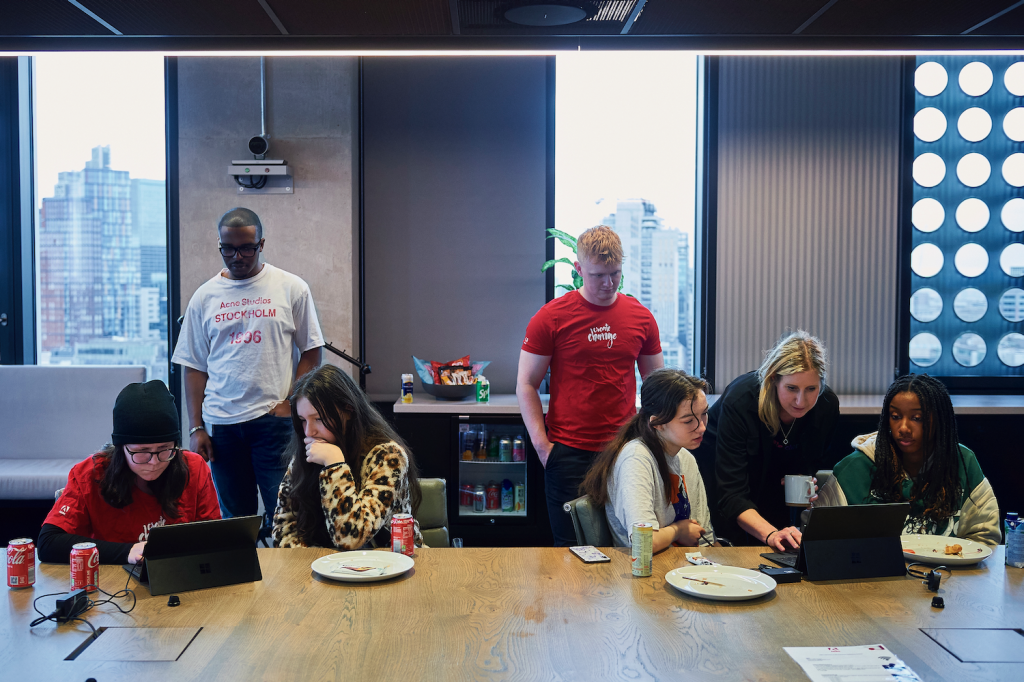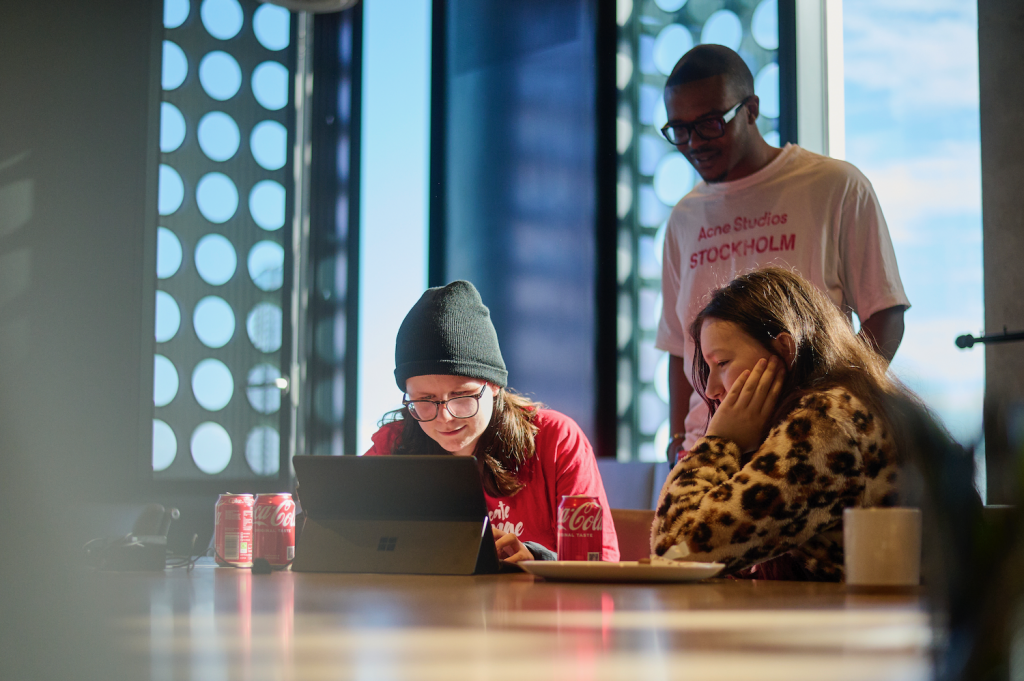Sam Adeyemi is a Creative Cloud Specialist at Adobe with a passion for using creative mediums to solve real life challenges. Sam began his entrepreneurial journey as a freelancer aged 14 years old, as a response to academic challenges he incurred. He honed those skills to land him his dream role at Adobe.
How did your journey at Adobe begin?
I came across Adobe at a much-needed moment in my life, because at the time I was getting into a bunch of trouble outside of school. I never had an outlet to express myself, but I got quite lucky because at my mum’s church they had a lot of equipment and software. I received training and used YouTube tutorials. From there I started producing flyers for events and services using Photoshop. I got to a point where I was like, ‘I’m creating all this content for the church. Why don’t I start doing it for myself too?’ So I started doing freelance work reaching out to artists through Instagram and telling them that I could help with their brand. I worked with some smaller artists at the time, just to build my portfolio. The growth was organic through word of mouth. Clients kept coming back and recommending other jobs, so I did that right through to finishing university.

What aspects of your career make you especially proud?
I think it’s touching on the point that we discussed before about how I got here. I feel like an ambassador almost, for younger people who come from less advantaged backgrounds like me. Ten years ago, if you’d asked me if I could be in this position right now? I would’ve told you no chance. I didn’t know what I was capable of because there were no role models. There was no one I could look up to and say ’I can get this job because he has come from the exact same background as me, so if he can I can.’ If I can just get one person to believe that they can break into the industry because of me, that makes it all worth it.
You’ve touched on this a bit with regards to how design and creativity have impacted you, but what do you think is the fundamental role design and creativity play in society?
I think everyone will have different takes on this question. I think the role of design and creativity is centred around expression and evoking a new response or emotion. Design and creativity are core to how we as individuals and organisations communicate. None of us can actually communicate who we are without having to produce some kind of content. And this even more so in the digital world we live in now. I feel like that’s the fundamental role of design: to get your message across, to represent and communicate.

Adobe’s tagline champions community and teamwork. What do you think are the most important aspects of learning and growing as a team?
For me, collaboration opens up the opportunity to widen your perspective through diversity of thought. It’s about empathy. The more we engage as a community, the more that we can spread that diversity and make it commonplace to be around and learn from people with different views and experiences. I actually can’t do my job alone. I have an incredible team who I learn so much from. If you think about most learning experiences, we’re very rarely ever self-taught. I think understanding our differences and working together makes us better people and gives us a better worldview.
You mentioned opportunities at the church, which you got through volunteering – what other kind of advice would you give a young person pursuing a similar career?
I have three points! The first is volunteering. I think volunteering is a bit of a cheat code, because you can find what you’re passionate about and build tangible skills around it. As I said, volunteering at my local church was how I gained the skills in Adobe Creative Suite, as well as where I started dabbling into video production and audio engineering. I was doing it for free, but it gave me the credibility I could then use to build on my career.

What would you say to a young person who might be nervous about volunteering for the first time?
See it as preparation to work. Volunteering was something I could do because I wanted to do it – not just because someone was paying me. There was a specific kind of freedom that came with that. I’d say find something that you’re aligned to, and don’t just do it because you think it’s the right thing to do. Have a real think about what you’re passionate about. If you’re passionate, it shouldn’t be hard to make that first step. Doing new things is always hard but one thing that I’ve found is that doing those hard things is where I’ve grown the most. Hard things are worthwhile. I call them the growth zone. One of my mentors that helped me early on in my career would always say that. He kept telling me, ‘outside of the comfort zone is the growth zone.’
The second piece of advice is that every single experience you’ve had in your life makes up your career experience. At the start of my career, I was working in a burrito shop for about six months. I learned how to be personable and build rapport – actually I got my first foot into the industry through that burrito job. My now mentor, Ed Hill, he came to the shop one random morning (he was quite picky), but I served him and made a little joke of it – he came back afterwards to tell me I had really good selling skills. He said ‘here’s my card, let’s have a conversation.’ Well that conversation is part of my story. If it wasn’t for him, I wouldn’t have been able to get my professional at the software company, SAP. So, there’s no such thing as a bad experience. Sometimes, you just don’t know where good experiences will come from. There’s no job interview I’ve done where I haven’t mentioned that story.
It’s such a unique and dedicated story for a job interview, too – they’ll always remember burritos.
Exactly! Right. It’s about how all of your experiences have made you who you are today. One thing I’ve found is that Adobe values uniqueness more than anything, because when you bring a bunch of unique people together, that’s when you have true diversity. It’s your individual experiences that what make you different. Everything has prepared you for where you are now. And so you should incorporate all of your experiences, whether that would be volunteering, whether that be doing some stuff at school, it all kind of rolls up into who you are now. It’s important not to forget that.

The last piece of advice is that careers are just that. They’re careers. Careers are journeys. There will always be ups and downs with every experience that you have, but every experience you have makes you more informed for the future, right? So I wouldn’t worry too much about the end goal. Focus more on making the most of the journey. Every experience is going to make you more informed for what you want to do. And actually, right now, if you ask me, ‘what do you want to be in ten years?’ I have no idea.


Sam Adeyemi in an Adobe Masterclass for Saturday Club members from Escape Studios
Interview conducted and edited by Anisha Jackson